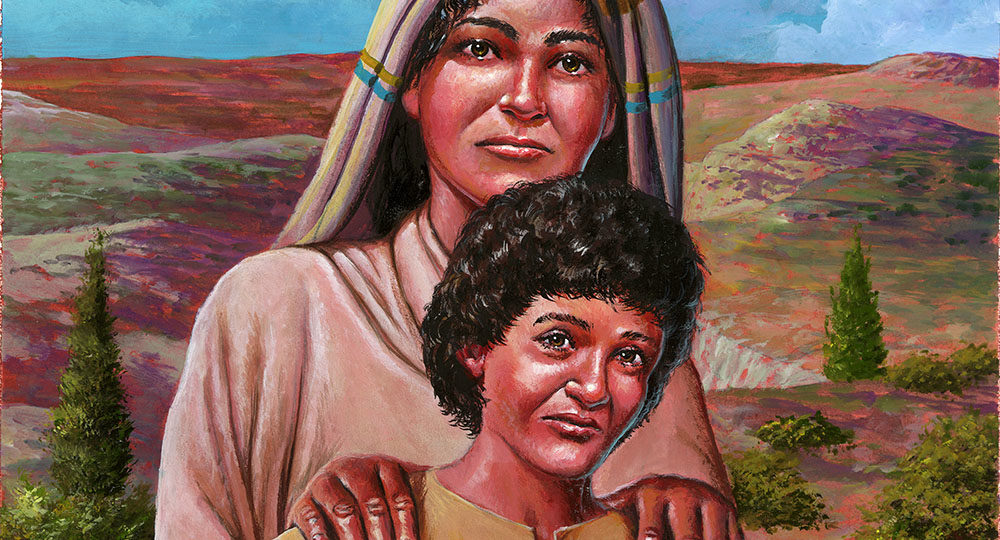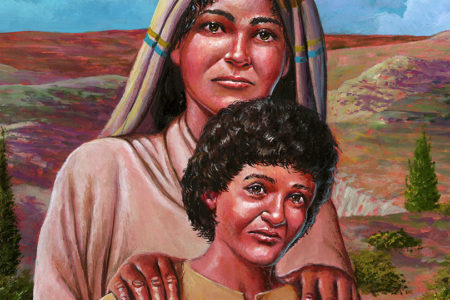Abraham: The Man Who Couldn’t Wait
Abraham Couldn’t Wait For God’s Promise
Abraham was a man who couldn’t wait! The result of his impatience has been a conflict that has spanned the millennia and, even at the present moment of history, is far from being resolved. The underlying themes in much of the current international rhetoric have been the recurring problems of the Jew, the “occupied territories,” the Palestinians, and Israel’s right to a homeland. Since the promises of the land were given to Israel by the Lord, it is apparent that the solution to the current unrest can be found only in the Word of God.
God’s Promises Regarding Abraham’s Seed
The first promise of a seed to Abraham is recorded in Genesis 12:2: “And I will make of thee a great nation.” After his separation from Lot, the Lord said to Abraham, “For all the land which thou seest, to thee will I give it, and to thy seed forever. And I will make thy seed as the dust of the earth, so that if a man can number the dust of the earth, then shall thy seed also be numbered” (Gen. 13:15–16). This was the second time God had promised a seed to Abraham, yet he was not convinced that God could perform what He had promised. After all, he reasoned, he and Sarah were far too old to have children. Tired of waiting for God’s timing, Abraham looked for another route.
Is It Eliezer?
Abraham wondered if his seed was to be Eliezer, a servant in his house from Damascus. Perhaps he was to be the promised heir. “And Abraham said, Lord Gᴏᴅ, what wilt thou give me, seeing I go childless, and the heir of my house is this Eliezer of Damascus? … Behold, to me thou hast given no seed” (Gen. 15:2–3). The Lord immediately ruled out that possibility. “This shall not be thine heir; but he that shall come forth out of thine own loins shall be thine heir” (Gen. 15:4).
God also promised Abraham that his seed would be as numerous as the stars of Heaven (Gen. 15:5). Over and over the Lord reiterated His promise to His servant Abraham, and he believed God (Gen. 15:6), but still no child was born.
Is It Ishmael?
As more time passed and old age crept up on Abraham, he grew even more impatient.
Then, in a moment of weariness or weakness, Sarah confronted Abraham with a very interesting suggestion. Perhaps they could help God. She was, by every human standard, totally barren and was now well past the normal age of childbearing. But, she pointed out, according to a custom of the day, a barren woman could give her maid to her husband as a wife for a short time. If a son were born of that union, he would be regarded as the wife’s son. Then, if the husband said to the child, “You are my son,” he became the adopted son and the heir. The plan sounded good to Abraham, but we know only too well that man’s plans are not always God’s plans.
Thus it was that Sarah gave her Egyptian maid Hagar to Abraham to be his wife. But when Hagar became pregnant, Sarah utterly despised her and mistreated her so badly that Hagar fled into the wilderness to escape the ire of her mistress. While she was alone in the wilderness, the angel of the Lord came to her and told her to return home, assuring her, “I will multiply thy seed exceedingly, that it shall not be numbered for multitude” (Gen. 16:10). He also instructed her to name the child Ishmael, meaning God hears (Gen. 16:11). The angel told Hagar that God would make of her son a great people, and He outlined the characteristics that would be displayed by Ishmael and his descendants: “And he will be a wild man; his hand will be against every man, and every man’s hand against him; and he shall dwell in the presence of all his brethren” (Gen. 16:12).
After Ishmael was born, Abraham apparently considered him to be the promised son, for when he was 99 and the child was 13 they were both circumcised on the same day. This act displayed Abraham’s concern and hope for his son through Hagar (Gen. 17:23).
Just as the angel of the Lord told Hagar, Ishmael and his descendants did prove to be very wild and tempestuous people. They were warriors who lived on the border of their brethren to the east. Also in fulfillment of the angel’s promise, the twelve princes whom Ishmael begot (Gen. 17:20) have become a major ethnic group worldwide—the Arab people—and they have proven to be a major adversary to the Jews throughout the ages.
God Had Another Plan
While God did promise that Ishmael would be blessed, would be fruitful, would multiply greatly, and would become a great nation, He told Abraham that Ishmael was not the son of promise. His covenant to Abraham would be through Isaac, a child yet to be born to Abraham and Sarah (Gen. 17:15–19).
The following year the miracle took place. Sarah gave birth to the long-promised son and heir of the covenant (Gen. 21:1–2). On the day of the feast when Isaac was weaned, Sarah saw Ishmael mock her son, and she demanded that Hagar and Ishmael be cast out. Abraham was grieved, but he nevertheless sent them out into the wilderness with only some bread and water to sustain them.
Near starvation, Hagar cried out to God, and He made miraculous provisions for her and her son. As Ishmael was near death, the Lord assured Hagar, “I will make him a great nation” (Gen. 21:18). Thus banished from home, Ishmael married an Egyptian girl given to him by his mother (Gen. 21:21). He apparently wandered around for the rest of his life in the wilderness area surrounding Beersheba.
The biblical account goes on to say that Ishmael did return home to help bury his father in the cave of Machpelah at Hebron (Gen. 25:9) and that he had 12 sons (Gen. 25:13–16) and a daughter, Basemath, who married Esau, the son of Isaac (Gen. 36:3).
The Results of Abraham’s Impatience
A Warlike People
If Abraham were alive today, he surely would regret heeding Sarah’s suggestion regarding his relationship with Hagar. There has been constant animosity between the sons of Abraham by Hagar and Sarah from the time of their birth down to the present day. In fact, on many occasions there has been much bloodshed between their descendants, the Arabs and the Jews. As we consider the Middle East situation today, there does not seem to be a solution to this long-standing problem. At best, there is a standoff from time to time. It is apparent to the serious student of the Scriptures that there will never be peace in the Middle East—or in the world—until “The Prince of Peace” (Isa. 9:6) comes.
Long after the time of Abraham, a great host of the Arab people, Ishmael’s descendants came under the influence and domination of the tyrannical Islamic religion as followers of Muhammad. There are varying attitudes within Islam, from the ultra-fanatical Shiites, who cry for a Jihad (holy war) against anything they dislike, to the more subdued Sunnis. Of course, we must also remember that there are some fine Christian Arabs who love the Lord and faithfully serve Him.
In light of the current unrest in the Middle East, another important issue must be clarified. The Iraqis claim that they are not Arabs but are descended from Midian, a son of Abraham through Keturah, whom Abraham married after the death of Sarah (Gen. 25:16). Moses later found refuge in the land of Midian and married the daughter of Jethro, the priest of Midian (Ex. 2:15, 21).
The friendly relationship between Midian and Israel ended, however, when the elders of Midian joined with the elders of Moab in asking Balaam to curse Israel (Num. 22:4–7). The result was a war of vengeance against the Midianites. Their rulers were put to death, and Balaam was killed (Num. 31:1–8). Later Gideon fought the Midianites (Jud. 7).
There apparently has been a close relationship between the descendants of Ishmael and the descendants of Midian through the centuries. Therefore, the Iraqis are, in one way or another, tied to the nomadic tribes that live east of Israel through either Ishmael or Midian. Historically and biblically, both have been enemies of Israel.
Today, 4,000 years later, nothing has changed. The same nations are lined up against one another. Although the circumstances are vastly different, the common enemy is still the same—Israel.
An Allegorical Lesson
Paul mentioned the two sons of Abraham in Galatians 4:15–31. He cited Ishmael, who was “born after the flesh” (v. 23), as a type of those Jews who cling to the rabbinical traditions and the Mosaic Law. They do not realize that the Law is transitory, and thus they fail to see the grace of God as the only way to fulfill the Law. Like Ishmael, they are sons of Hagar, the bondmaid, sons “after the flesh.” Their ultimate fate is to be cast out, as were Hagar and her son. Conversely, those in Christ are like Isaac, children of Sarah, the free woman.
As children of God, we must learn that we cannot please Him by keeping the Law. People become bound by the Law and enter into a works salvation system, which leads to bondage. This was the thrust of Paul’s argument in Galatians, and he concluded, “So then, brethren, we are not children of the bondwoman, but of the free” (v. 31).
Applied Truth
Because of Abraham’s impatience, the conflict still rages on. The sons of Ishmael continue to be at odds with the sons of Isaac.
In the spiritual realm, Christians are sometimes impatient, as was Abraham. New believers in Christ desire instant spirituality, Instant maturity. Such impatience often causes them to come crashing down spiritually. They become confused, are tossed about by every wind of doctrine, and have very little stability. They become casualties, live defeated lives, and spend their days like Hagar and Ishmael, out in the wilderness.
We must learn to do what Abraham couldn’t seem to do: wait on the Lord and allow Him to work things out. God is not in a hurry. He does things in His own time. We must learn to follow His schedule for our lives.
Little did Abraham know what he was doing when, in his haste, he followed the suggestion of Sarah and fathered a child by Hagar. It would have been far better had he waited upon the Lord, and the same is true for believers today.








This was a great article to read. It hinges on straightforward and true teachings of the bible.
May you continue in the good work of teaching the World that the real war is the war between God & the devil; and may each of us find themselves on God’s side when the Prince of Peace returns.